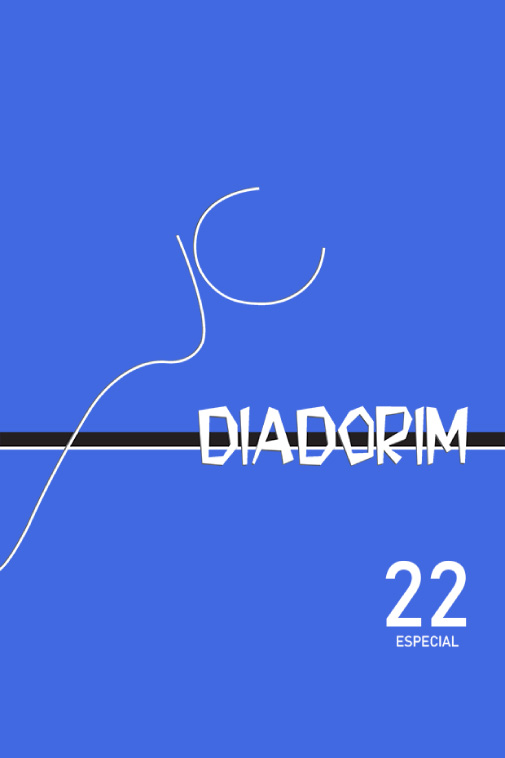Role-playing and masks in As vistas do Dr. Valdez by João Paulo Borges Coelho
DOI:
https://doi.org/10.35520/diadorim.2020.v22n3a36379Palavras-chave:
power, colonial regime, independence, role-playing, masksResumo
In the novel As Visitas do Dr. Valdez, by João Paulo Borges COELHO, role-playing and masks (literal or figurative) are central topics, connected to power or submission within social relationships, during the transition between the colonial regime and independence in Mozambique. They serve several purposes in the story, such as to invoke the past and insert it into the rapidly changing present – through the mask of Dr. Valdez concocted by Vicente -; to momentarily extend a political and social order that is progressively wearing away – through the authoritative mask of Sá Caetana - ; or to introduce without violence the essence of change into former colonial relationships, which predicts the end of the colonial way of living.
Sá Caetana, coming from a colonizing family, uses a traditional authoritative attitude towards Vicente that she does not wish to see subverted; a mask which she cannot forgo. Vicente, on the other hand, is divided between the submissive and obedient memory of his father, Cosme Paulino, who was a servant to the family, and the new callings of independence and decolonization. This role-playing and these masks lead the characters into a dead-lock without solution: the simultaneous impossibility of keeping up the role-playing or of dismantling it entirely. In this proposal, we aim to analyse how, in the story, wearing a certain social mask is both part of the colonial past and of the decolonized present and future, and how these masks represent an impediment to the creation of real and emotional connections.
Referências
ALVES, I. M. M. Ser Velho em As Visitas do Dr. Valdez de João Paulo Borges Coelho. Universidade de Aveiro, 2011. Dissertação de Mestrado em Línguas, Literaturas e Culturas, Universidade de Aveiro, 2011. Available at: http://www.retrievo.pt/record?id=oai:ria.ua.pt:10773/6876
BARBATO, L. F. T.; VEIGA, V. N. Um jogo de relações: os dependentes na obra As Visitas do Dr. Valdez. Revista Eletrônica Literatura e Autoritarismo, Nº 25, p.59-72, 2015. Available at: https://periodicos.ufsm.br/index.php/LA/index
COELHO, João Paulo Borges. As Visitas do Dr. Valdez. Lisboa: Caminho, 2004.
FORNOS, J. L. G. Desmascaramento do mundo colonial moçambicano em As Visitas do Dr. Valdez, de João Paulo Borges Coelho. Navegações, V. 7, Nº2, p. 194-199, 2014. Available at: http://revistaseletronicas.pucrs.br/ojs/index.php/navegacoes/article/view/21052
MARÇOLLA, B. A.. Identidade, alteridade e memória em As Visitas do Dr. Valdez, de Borges Coelho. Cadernos Cespuc de Pesquisa, Nº16, p.141-151, Belo Horizonte, 2007. Available at: http://periodicos.pucminas.br/index.php/cadernoscespuc/article/view/14768/11447
OLIVEIRA, N. S. Simulação e/ou dissimulação: reflexão sobre a estética em Memórias Póstumas de Brás Cubas e As Visitas do Dr. Valdez. SCRIPTA, V.16, Nº 31, p.119-138, Belo Horizonte: PUC Minas, 2012. Available at: https://www.researchgate.net/publication/284636965_Simulacao_eou_dissimulacao_reflexao_sobre_a_estetica_em_Memorias_postumas_de_Bras_Cubas_e_As_visitas_do_Dr_Valdez_DOI_-_105752P2358-34282012v16n31p119
SERAFIM, Y. O olhar por detrás da máscara em As Visitas do Dr. Valdez. Revista Decifrar, Vol. 04, Nº07, p. 19-30, Manaus: Amazonas: Brasil, 2016. Available at: http://www.periodicos.ufam.edu.br/Decifrar/issue/view/96
SILVA, L. A. M. G. A representação do «ishima» no romance As Visitas do Dr. Valdez de João Paulo Borges Coelho. São Paulo: Universidade de São Paulo/Faculdade de Filosofia, Letras e Ciências Humanas, s.d. Available at: https://uspdigital.usp.br/siicusp/cdOnlineTrabalhoVisualizarResumo?numeroInscricaoTrabalho=3339&numeroEdicao=22
Downloads
Publicado
Edição
Seção
Licença
Transferência de direitos autorais - Autorização para publicação
Caso o artigo submetido seja aprovado para publicação, já fica acordado que o autor autoriza a UFRJ a reproduzi-lo e publicá-lo na Diadorim: Revista de Estudos Linguísticos e Literários, entendendo-se os termos "reprodução" e "publicação" conforme definição respectivamente dos incisos VI e I do artigo 5° da Lei 9610/98. O artigo poderá ser acessado pela internet, a título gratuito, para consulta e reprodução de exemplar do artigo para uso próprio de quem a consulta. Essa autorização de publicação não tem limitação de tempo, ficando a UFRJ responsável pela manutenção da identificação do autor do artigo.

A Revista Diadorim utiliza uma Licença Creative Commons Atribuição-NãoComercial 4.0 Internacional (CC BY-NC 4.0).

